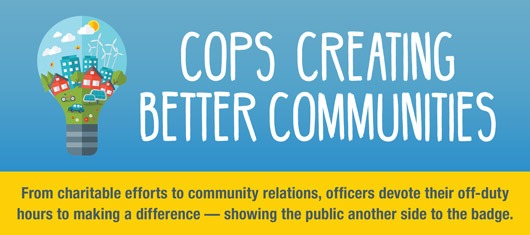 When people encounter the police, it can be hard to see beyond the badge. After all, it’s very often under stressful circumstances. And depending on individuals’ opinions of the profession, they also could hold suspicions or resentment toward law enforcement, especially in light of negative media portrayals of high-profile incidents.
When people encounter the police, it can be hard to see beyond the badge. After all, it’s very often under stressful circumstances. And depending on individuals’ opinions of the profession, they also could hold suspicions or resentment toward law enforcement, especially in light of negative media portrayals of high-profile incidents.
But there’s more to officers than just the job. Like everyone else, law enforcement professionals have families, hobbies and are active members of their hometowns. In fact, police departments across the country are filled with members who donate their time and talents to local organizations, both on and off duty. Their efforts not only provide charitable service, but as illustrated by the following examples of FOP members’ volunteerism, their commitments can make a difference on the job, too.
GREEN ENCHILADAS FOR ABBY
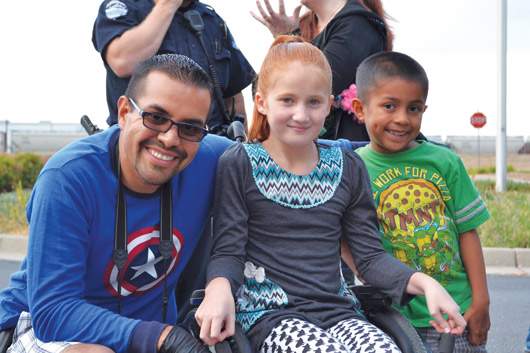
Officer Mauricio Alex Quiñones with Abby Holbrook and his son, Kaleb
As a volunteer chaplain for FOP Lodge #52, Mauricio Alex Quiñones, a school resource officer for the Loveland Police Department in Colorado, is frequently called to counsel members. While looking in on a member who was recuperating from a gunshot wound, Quiñones learned about a brave 10-year-old who subsequently captured his heart.
Abby Holbrook suffers from transverse myelitis, which creates lesions on her spinal cord, and Chiari malformation, a structural defect in the cerebellum. The conditions have already required eight brain surgeries and nine bladder surgeries. Abby read about the officer’s injury and wrote him a letter offering her encouragement based on her experiences in the hospital. When he was discharged, the officer met Abby and the local media captured the moment.
“That’s how I was introduced to Abby,” remembers Quiñones. “I then became Facebook friends with Abby and her mom, and we created a friendship.”
When Abby’s mother created a fundraising website to cover some of the skyrocketing medical costs, Quiñones and his wife agreed to donate $100 but wondered if it was enough. He wanted to come up with a way to contribute more. “That’s when we had the idea of an enchilada sale,” he says.
Quiñones used his $100 to purchase the ingredients and sent out word about the Green Enchiladas for Abby sale. “I promoted it to my Facebook friends and through the schools I work at, and the response was amazing,” he says. “We ended up creating more than 2,100 enchiladas and turned that $100 into $4,000.”
Quiñones sees his volunteerism, which includes activities at church and within the FOP, as a balance against the stresses of police work. “Part of the reason why I still enjoy this job is that I find involvement outside of work,” he explains. “The reason I don’t feel burned out is because I have balance between my family, job, community and church.”
Abby’s health challenges are ongoing. If you would like to help, visit www.gofundme.com/h9xcssng.
WHY’D YOU STOP ME?
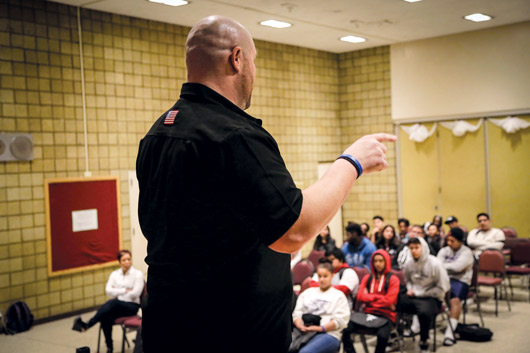
Officer Jason Lehman, founder of Why’d You Stop Me?, makes a
presentation at Beach High School in Long Beach, California, in January 2016.
What would you do if traditional investigatory methods into a gang threat against the police didn’t turn up leads? Police Officer Jason Lehman of California FOP Lodge #1 convinced his superiors at the Long Beach Police Department to allow him to speak with local students.
“I said, ‘Let me go into the high school where the younger gang members are coming from and talk to the at-risk kids,’” recalls Lehman. “I was hoping to impact someone to get the word out and stop the murder ambush of police officers.”
Although he didn’t come up with verifiable leads — and fortunately, the threat never transpired — the experience showed Lehman just how much of a perception gap exists between residents and law enforcement.
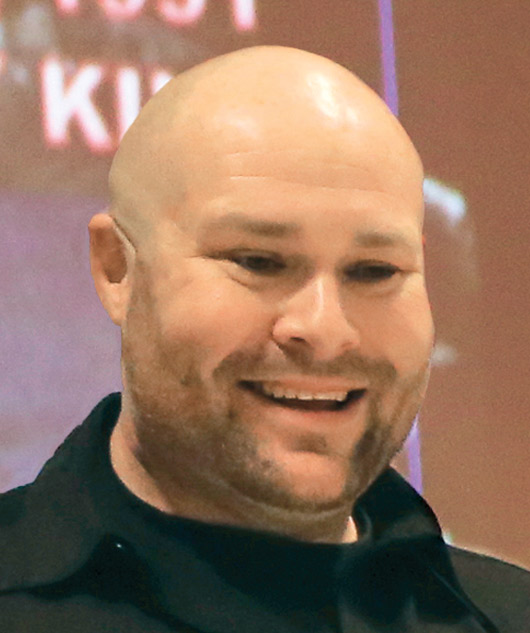
Officer Jason Lehman
“Police officers don’t want to be proactive for a number of reasons. One is fear. Fear of Instagram or Internal Affairs,” he states. “Also, policing occurs more frequently in inner cities, so in those neighborhoods, the police look like a big force. You see them every day, but they never talk to you, and you hear bad things about police officers.”
Still, Lehman left feeling like the students were receptive to adopting a new attitude. That inspired him to speak to other area schools and police departments to help bridge the gap.
Then in 2014, he established Why’d You Stop Me? (WYSM), a nonprofit agency promoting better relations between police and the public.
“We want to empower community members and police officers to embrace new and effective ways to communicate,” says Lehman. “This is the first system to train police and community leaders with the same communication system. For example, we tell students that a stop might occur for a reason beyond their control. On the flip side, we remind officers not everyone on a street corner is a drug dealer.”
This year, WYSM launched a national train-the-trainer program, and officials from the Austin Police Department will be the first students.
“They are getting great training to take back to Austin and use to hold their own community meetings,” Lehman concludes.
Find out more at www.wysm.org.
ANY KID CAN FISH
When FOP Lodge #49 in Austin, Texas, was approached about supporting a fishing event to give patients at Dell Children’s Medical Center of Central Texas a day of fun, the membership quickly took the bait.
“Previously, our lodge was involved in youth sports programs,” notes Lodge President Michael Lang, a sergeant with the Texas Department of Insurance, Fraud Unit. “Then this came along and we thought it was a really good idea.”
For the past several years, the lodge has both raised money to support and helped host the Any Kid Can Fish event held on hospital grounds. “One year, we paid for a 20-foot trailer made out of Plexiglas that showed a cross-section of a river or lake and was filled with fish,” says Lang. However, the real fun begins as soon as the kids get to test the waters. “These kids are in the hospital for months at a time,” says Lang. “This gives them a chance to get out and do something different. Also, volunteers give out goodie bags with things like coloring books, crayons and stickers.”
For Lang, the best part is visiting patients who are too ill to leave their rooms and handing them a goodie bag. “You just remember the looks on their faces and the enjoyment they get,” he says.
Lang also values the interactions he and other off-duty officers have with the public in attendance. “Law enforcement generally are perceived as being a hindrance or someone who shows up as a result of a 9-1-1 call when something terrible has happened,” he explains. “I think what an event like Any Kid Can Fish does is it lets not only the kids but the parents know we’re people, too. It gives us a venue to show the softer side of the profession.”
OPERATION OPEN HEART
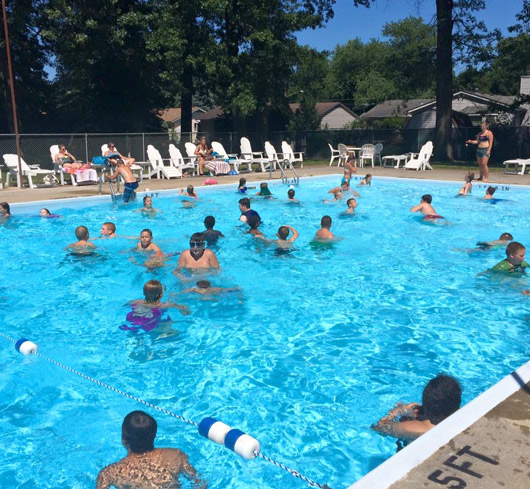 More than 50 years ago, Ohio State Patrol Officer David Harper, who had grown up in an orphanage, wanted to give back to other boys who were placed into the foster system. On one of his days off, Harper took 15 kids on an all-day picnic, and Operation Open Heart was born.
More than 50 years ago, Ohio State Patrol Officer David Harper, who had grown up in an orphanage, wanted to give back to other boys who were placed into the foster system. On one of his days off, Harper took 15 kids on an all-day picnic, and Operation Open Heart was born.
Over the years, events grew and now the highlight is an annual weeklong campout. As president of Operation Open Heart, City of Lorain P.D. Sergeant and Ohio Lodge #3 member Robert B. Brown oversees the tradition.
“These kids get to forget about their lives for a week,” says Brown. “We take them swimming, on airplane rides and for boat rides. We have campfire talks and fireworks.”
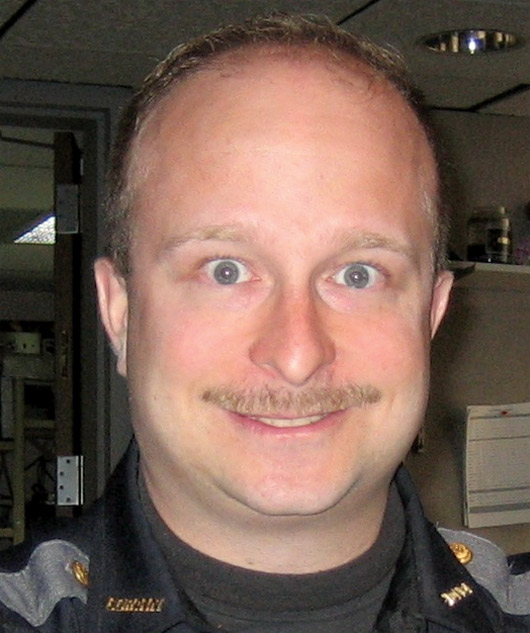
Sergeant Robert B. Brown, Ohio Lodge #3
What’s more, the camp is 100% run by volunteers, the majority of whom come from area law enforcement agencies. “Most guys donate a week of vacation so they can stay with the kids,” Brown notes.
But as much as the campout provides a good time, the connections officers make with the campers become far more lasting.
“You see the kids when they are young, then maybe they get into trouble at age 13, 14 or 15, but you have a relationship with them, which makes it easier to try to set them straight or ask what’s going on,” explains Brown.
During his 20-year tenure with the organization, Brown has seen many of the participants find personal and professional success.
“We’ve had quite a few campers who have gone on to do bigger and better things,” says Brown. “They write to us that they’re married with their own kids and thought it was cool what we did for them. We’ve had kids join the military. Others have become policemen and tell us that summer camp was the best week every year as a kid. That’s quite rewarding.”
For more information, visit www.facebook.com/OperationOpenHeart.
SCOUTREACH
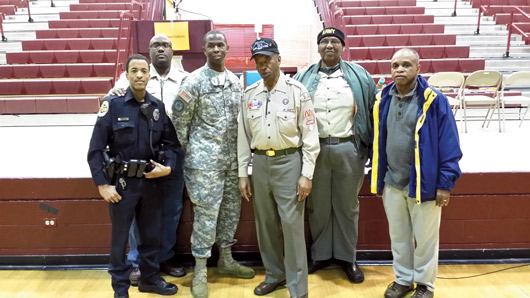
Captain Rice (second from left), scout leaders and volunteers organize a yearly Cultural Day
that not only helps Scouts earn a merit badge but has also grown into a community event.
To earn the Boy Scouts American Cultures Merit Badge, scouts must attend a special event celebrating a culture, talk with someone about his heritage or learn a song, dance or poem representative of a cultural tradition, among other requirements.
As a lifelong Boy Scouts supporter (first as a scout and then as a leader), Jeffery B. Rice Sr., saw the badge requirements as an invitation to embrace diversity. For the past eight years, the 17-year veteran of the Huntsville Police Department and member of Alabama FOP Lodge #6 has served on the Scoutreach Cultural Day Activity Committee for the Talakto Boy Scout District.
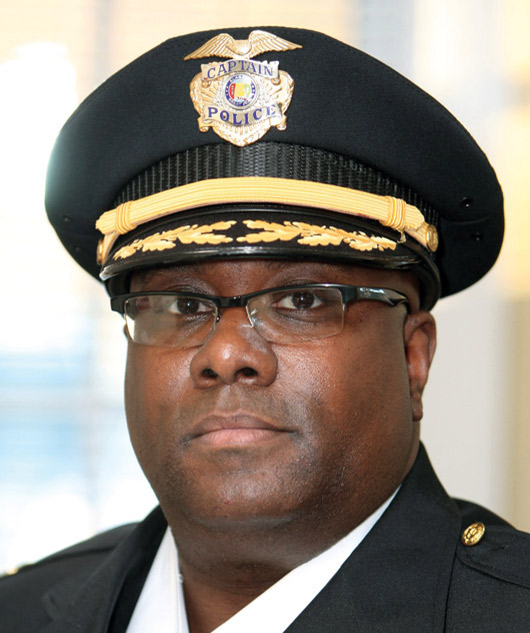
Captain Jeffery B. Rice Sr., Alabama Lodge #6
“The Scout Leaders Council, which is a group of leaders who have troops from inner city and rural areas, decided to pool resources and have a Cultural Day so the scouts could earn their American Cultures Merit Badge,” he says. “We thought it was important to make sure the boys understood the importance of diversity and that America is a melting pot.”
Rice also believes the event presents an opportunity for the kids to learn more about where they live. “Huntsville is a culturally diverse city, an international city,” he explains. “The Cultural Day gives them an insight into cultures, races and ethnicities in the community. At an early age, they learn to respect different people’s cultures. As they grow up, they’ll be better able to mingle with all the people in the community, and that will help them with future job opportunities.”
The community also has embraced the annual event. “When Cultural Day started, it was an experiment,” says Rice. “This year, there were people from smaller communities outside of Huntsville. Also, other cities are mirroring what we’re doing, and that tells me that word is getting out.”
Learn more at www.talakto.org.
MOTHERS AGAINST DRUNK DRIVING
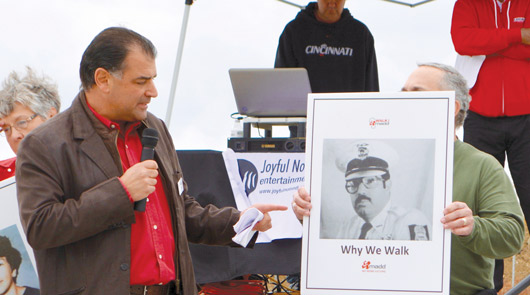
Retired Deputy Chief John DiPietro hosts a victim tribute at the annual Walk Like MADD.
As the crime prevention specialist and community relations officer for the Miami Township Police Department in Ohio, John DiPietro frequently received requests from community groups to volunteer.
Of course, he obliged as often as possible, but over his 26-year career, DiPietro developed a few favorite causes, including Mothers Against Drunk Driving (MADD).
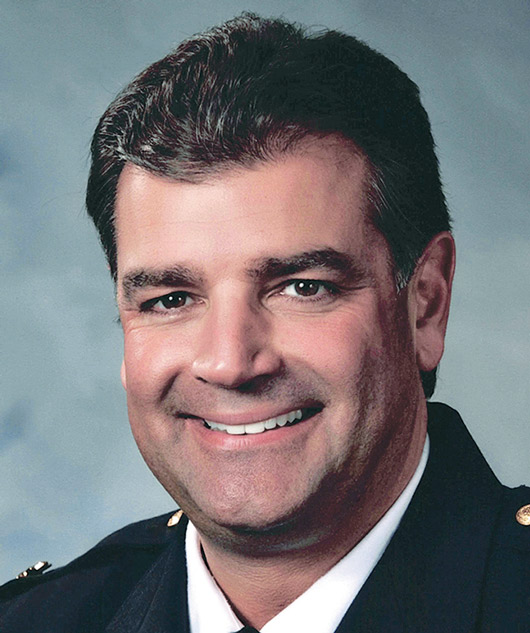
Retired Deputy Chief John DiPietro, Ohio Lodge #117
Seventeen years ago, DiPietro learned that his then-girlfriend lost her sister in a vehicle accident due to an impaired driver. That made the group’s mission personal to him and prompted him to learn more about its various programs.
“My girlfriend’s mother explained to me how MADD does a wonderful job with victim services, and that’s why I really got involved,” says the president of FOP Lodge #117.
Over the years, DiPietro contributed to MADD in various ways, but whenever possible, he tried to connect the group with his police work. “I would invite MADD to speak at the briefing before the officers went to work a DUI checkpoint. They would explain how when you remove impaired drivers from the roadway, you will never know, but that person could have killed themselves or other innocent drivers. It really gave meaning to what the officers were about to do,” says DiPietro.
Now that he’s retired, DiPietro devotes even more time to the organization as the state chairman.
“I function as ambassador for MADD. I coordinate different efforts throughout the state, including victim tributes and vigils, and fundraising,” he says. “One of our fundraisers is Walk Like MADD. Police departments create teams to walk, and the team that raised the most wins a trophy for the year. We’re providing opportunities for competition, and at the same time, we’re creating a funding mechanism for MADD to continue with its victim services.”
Read more about their efforts at www.madd.org.
INSPIRING BETTER CITIZENS

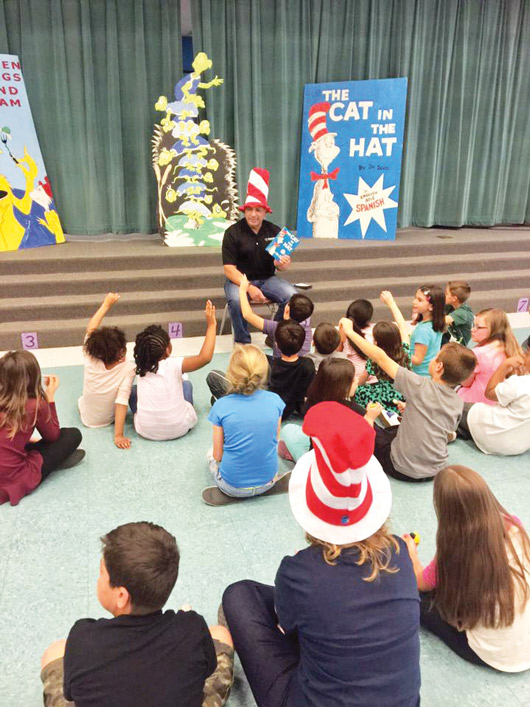
Anthony enthusiastically presents The Cat in the Hat to a group of elementary school students.
Brother Stavros “Steve” Anthony is not only a Las Vegas Lodge #1 member, retired captain with the Las Vegas Metropolitan Police Department, former member of the University of Nevada’s Board of Regents, College of Southern Nevada instructor, former mayor pro-tem and current Ward 4 city council member. He is, most importantly, a mentor and role model to youth through his community outreach. He considers the safety of youth a primary community responsibility and has been a longtime advocate for their well-being.
Anthony became involved in youth projects through the Safe Key program, which provides supervision for the children of working parents before and after school until a parent can retrieve the child. When Brother Anthony, who holds a master’s degree in political science and Ph.D. in sociology, realized that the children needed assistance with developing their reading skills, he concentrated his efforts in that area.
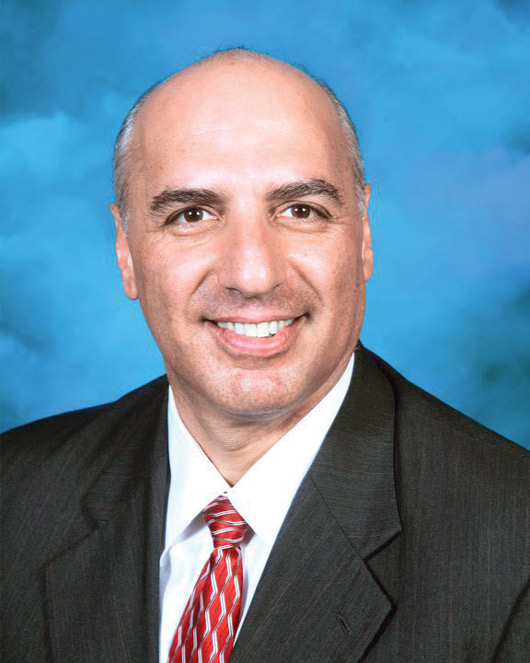
Stavros Anthony, Las Vegas Lodge #1
Brother Anthony now partners with local schools to read to groups of kids, encouraging literacy and, by choosing books with first responder themes, teaching children how to be better citizens — using his experience as a police officer as a way to engage and connect with them. “This is what cops do,” Anthony says. “They work with all areas of the community. It should be what you do as a police officer. This is why I like to read police stories as I can ad lib and make it more interesting for the kids.”
TAKING THE JOB HOME
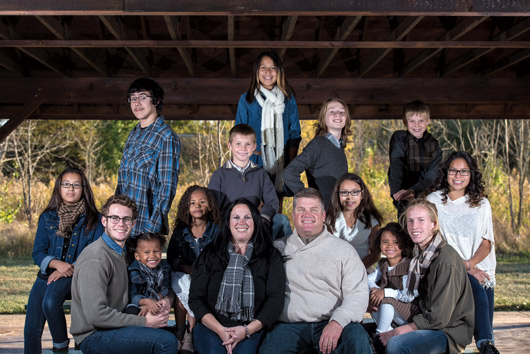
Community involvement for Indiana Lodge #198 Master Patrolman Matthew Johnston got very personal in 2013, resulting in a major family development. Click here to read the inspiring interview about how Johnston took four children into his family when their mother passed away of cancer.
Read this story in the Summer 2016 FOP Journal issue.




